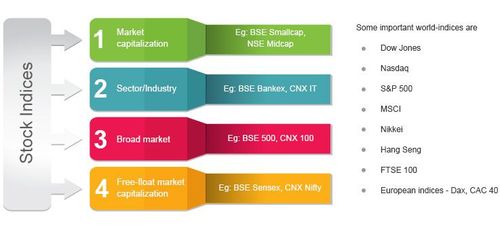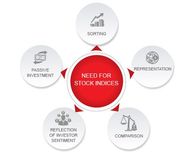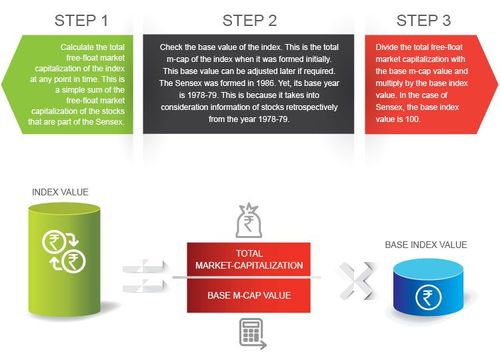What is Stock Market Index
- 5m•
- 3,458•
- Updated 26 May 2023
There are thousands of companies listed on stock markets, making it almost impossible to monitor each company. This is why stock market indices are created. Market indices bring together a select group of company stocks and regularly measures them to show the performance of the overall market or a certain segment of the market.
In short, an index helps investors understand the health of the stock market, enables them to study the market sentiment and makes it easy to compare the performance of an individual stock.
The Sensex and Nifty-50 are two popular benchmark indices that largely reflect the performance of Bombay Stock Exchange (BSE) and National Stock Exchange (NSE). To understand how each sector of the stock market is doing, there are sectoral indices such as Nifty Bank. Nifty Auto etc.
It means an index.
Read more to understand stock indices.
Click here to know about what stock market numbers say
What Are Stock Indices?
From among the stocks listed on the exchange, some similar stocks are selected and grouped together to form an index. This classification may be on the basis of the industry the companies belong to, the size of the company, market capitalization or some other basis. For example, the BSE Sensex is an index consisting of 30 stocks. Similarly, the BSE 500 is an index consisting of 500 stocks.
The values of the grouped stocks are used to calculate the value of the index. Any change in the price of the stocks leads to a change in the index value. An index is thus indicative of the changes in the market.
Some of the important indices in India are:
-
Benchmark indices – BSE Sensex and NSE Nifty
-
Sectoral indices like BSE Bankex and CNX IT
-
Market capitalization-based indices like the BSE Smallcap and BSE Midcap
-
Broad-market indices like BSE 100 and BSE 500

Why Do We Need Indices?
Indices are an important part of the stock market. Here’s why we need stock indices:

-
Sorting
In a share market, there are thousands of companies listed. How do you differentiate between all of those and pick one or two to buy? How do you sort them out? It is a classic case of a pin in a stack of hay. This is where indices come into the picture. Companies and their shares are classified into indices based on key characteristics like size of company, sector or industry they belong to, and so on.
-
Representation
Indices act as a representative of the entire market or a certain segment of the market. In India, the BSE Sensex and the NSE Nifty are considered the benchmark indices. They are considered to represent the overall market performance. Similarly, an index formed of IT stocks is supposed to represent all stocks of companies from the industry.
-
Comparison
An index makes it easy for an investor to compare performance. An index can be used as a benchmark to compare against. For example, in India the Sensex is often used as a benchmark. So, to find if a stock has outperformed the market, you simply compare the price trends of the index and the stock. On the other hand, an index can also be used to compare a set of stocks against a benchmark or another index. For example, on a given day, the benchmark index like Sensex may jump 200 points, but this rally may not extend to a certain segment of stocks like IT. Then, the fall in the value of index representing IT stocks could be used for comparison rather than each individual stocks. This also helps investors identify market trends easily.
-
Reflection
Investor sentiment is a very important aspect of stock market movements. This is because, if sentiment is positive, there will be demand for a stock. This will subsequently lead to a rise in prices. It is very difficult to gauge investor sentiment correctly. Indices help reflect investor’s mood – not just for the overall market, but even sector-wise and across company sizes. You can simply compare an index with a benchmark to see if has underperformed or outperformed. This will, in turn, reflect investor sentiment.
-
Passive investment
Many investors prefer to invest in a portfolio of securities that closely resembles an index. This is called passive investment. An index portfolio helps investors cut down cost of research and stock selection. They rely on the index for stock selection. As a result, portfolio returns will match that of the index. For example, if Sensex gave 8% returns in one month, an investor’s portfolio that resembles the Sensex is also likely to give the same amount of returns. Indices are also used to construct mutual funds and exchange-traded funds (ETFs).

How Are Stock Indices Formed?
An index consists of similar stocks. This could be on the basis of industry, company size, market capitalization or another parameter. Once the stocks are selected, the index value is calculated. This could be a simple average of the prices of the components. In India, the free-float market capitalization is commonly used instead of prices to calculate the value of an index.
The two most common kinds of indices are – Price-weighted and market capitalization-weighted index.
What is stock weightage?
Every stock has a different price. So, a 1% change in one stock may not equal a similar change in another stock’s price. So, the index value cannot be a simple total of the prices of all the stocks. Here is where the concept of stock weightage comes into play. Each stock in an index has a particular weightage depending on its price or market capitalization. This is the amount of impact a change in the stock’s price has on index value.
Kotak Research Centre offers stock research inputs for traders. Take a look at it here.
-
Market-cap weightage
Market capitalization is the total market value of a company’s stock. This is calculated by multiplying the share price of a stock with the total number of stocks floated by the company. It thus takes into consideration both the size and the price of the stock. In an index using market-cap weightage, stocks are given weightage on the basis of their market capitalization in comparison with the total market-capitalization of the index. For example, if stock A has a market capitalization of Rs. 10,000 while the index it is part of has a total m-cap of Rs. 1,00,000, then its weightage will be 10%. Similarly, another stock with a market-cap of Rs. 50,000, will have a weightage of 50%.
The point to remember is that market capitalization changes every day as the stock price fluctuates. For this reason, a stock’s weightage too changes every day. However, it is usually a marginal change. Also, the market capitalization-weightage method gives more importance to companies with higher m-caps.
In India, most indices use free-float market capitalization. In this method, instead of using the total shares listed by a company to calculate market capitalization, only the amount of shares publicly available for trading are used. As a result, free-float market capitalization is a smaller figure than market capitalization.
-
Price weightage
In this method, an index value is calculated on the basis of the company’s stock price, and not market capitalization. Stocks with higher prices have greater weightages in the index than stocks with lower prices. The Dow Jones Industrial Average in the US and the Nikkei 225 in Japan are examples of price-weighted indices.
There are also other kinds of weightages like equal-value weightage or fundamental weightage. However, they are rarely used by public indices.
Read more: All you need to know about the annual report click here






